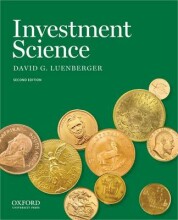Summary: Economics, Ethics And The Market Introduction And Applications | 9781134133253 | Johan J Graafland
- This + 400k other summaries
- A unique study and practice tool
- Never study anything twice again
- Get the grades you hope for
- 100% sure, 100% understanding
Read the summary and the most important questions on Economics, Ethics and the Market Introduction and Applications | 9781134133253 | Johan J. Graafland
-
1 Introduction
-
1.1 deel1
This is a preview. There are 9 more flashcards available for chapter 1.1
Show more cards here -
What is the neoclassical definition of economics? (Robbins)
The science which studies human behaviour as a relationship between ends and scarce means which have alternative uses. -
definition: "the science which studies human behavior as a relationship between ends and scarce means which have alternative uses" (Robbins) rests on 4 axioms, namely:
- the ends of human beings are various
- the various ends have different importance and are capable of being distinguished in order of importance
- the time and the means for achieving these ends are limited. Life is short and nature is niggardly
- the time and means are capable of alternative application for different ends -
What are the differences between moral standards and non-moral standards:
- Moral standards are prescriptive statements: describe what people ought to do.
- Moral standards should overrule non-moral standards
- Moral standards should be impartial (universal standpoint)
- Moral standards deal with issues that have serious consequences for the welfare of human beings
include values & norms -
What is the domain of economics?
Exists of all aspects of human behaviour in circumstances of scarcity. -
1.2 deel 2
This is a preview. There are 10 more flashcards available for chapter 1.2
Show more cards here -
What happens if we accept emotivism --> moral relativism
no moral grounds to address one's responsibility -
economics --> descriptive study
describe or explain the economy without reaching conclusions about what ought to be done -
what policy makers should do:
1. value statement: the government should foster goal x
2. positive statement: if the government intensifies the use of instrument y, x will increase
3. policy conclusion: the government should intensify the use of instrument y -
What are the 2 reasons for connecting economics and ethics?
1. Increase without limit may cause an inversion in goals and means.
2. Neoclassical economic theory is not so value-neutral as its proponents claim. -
When is exchange right according to Aristotle?
When it contributes to the community's self-sufficiency by correcting shortages & surpluses and is done from a virtuous attitude. -
1.3 deel 3
This is a preview. There are 13 more flashcards available for chapter 1.3
Show more cards here -
John Locke --> market system on the theory of moral rights
right to freedom & right to private property derived from state of nature
- Higher grades + faster learning
- Never study anything twice
- 100% sure, 100% understanding
Topics related to Summary: Economics, Ethics And The Market Introduction And Applications
-
The theory of perfect markets
-
Rationality - Conditions for rationality
-
Rationality - bounded ratioality
-
Rationality - commitments and procedural rationality
-
Self-interest and social preferences
-
Status goods, non-satiation and happines - preferences drifts form social interaction
-
Status goods, non-satiation and happines - Does welfare make us happier?
-
Economics as an inexact science - The hypothetico-deductive approach
-
Economics as an inexact science - Inexactness of the hypothethico-deductive approach
-
Economics as an inexact science - Deductive versus inductive method
-
Economics as an inexact science - Economics as cultural science
-
Utilitarianism and welfare theory - Characteristics of utilitarianism
-
Utilitarianism and welfare theory - Adaptations of utilitarianism
-
The ethics of duties and rights - Ethics of duty: Immanuel Kant
-
The ethics of duties and rights - Rights ethics: the libertarian view
-
The ethics of duties and rights - Real freedom and positive rights
-
The ethics of justice - The concept of justice
-
The ethics of justice - The theory of justice of Rawls
-
Virtue ethics and care ethics - The virtue ethics of Aristotle
-
Virtue ethics and care ethics - The virtue ethics of Adam Smith
-
Virtue ethics and care ethics - The ethics of care
-
Virtue ethics and care ethics - The impact of market operation on virtues
-
Overview - Communitarianism
-
Overview - Applying different ethical theories: a framework

































